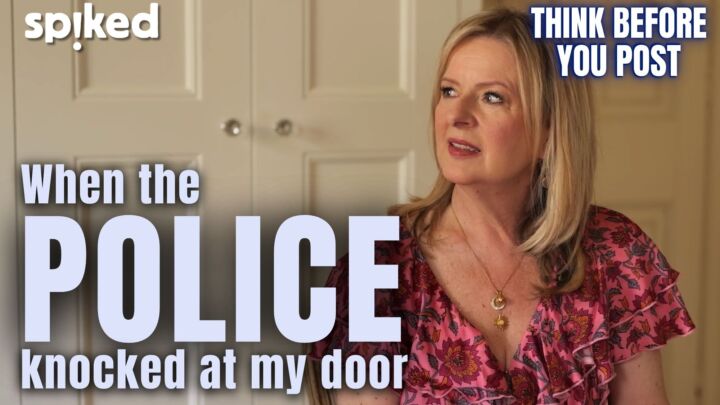Copyright and wrongs
Traditional powers of copyright are a barrier to the internet's development, argues the founder of Internet Freedom.

Want unlimited, ad-free access? Become a spiked supporter.
The internet has made it incredibly easy to distribute information. This is seen by some as a positive step for free speech, and by others as giving too much freedom to pornographers and racists.
But perhaps the most unexpected battle over information on the net is in the area of copyright. The ease with which images, software and music can be copied and distributed over the internet has created a heated debate about the copyright implications.
Take MP3 – a technology which compresses music files to less than one tenth of their original size, making it easy to distribute them over the net. Some powerful music corporations have tried to outlaw MP3, to block hardware that uses it, shut down websites that utilise it, and to legislate against translating other formats into it.
The problem is, the internet makes it just as easy to distribute material for which you hold the copyright (like your digitised holiday snaps) as it does for material for which you don’t hold the copyright (like Britney’s latest hit). The entertainment and software industries fear that internet-led piracy of their copyright material threatens their very existence. And in an effort to curtail the impact of the net, they backed the US Digital Millennium Copyright Act in 1998, which aims to strengthen their power to prevent copyright violation in the digital age (1). The industries also managed to persuade the US Senate to earmark $4million for copyright prosecutions in 2001, and $10million in 2002 (2).
The idea of copyright started with the Statute of Anne in Great Britain in 1710, brought in to deal with printing monopolies during the Enlightenment – when printers had a monopoly over the printing of books and could charge high prices for them (3). The statute’s aim was to limit the printing monopoly by creating copyright ownership restricted to 14 years, after which a work would be exposed to the full forces of market competition and anybody could print it. The statute gave authors some degree of recompense for their work by granting ownership of copyright to them rather than the printers. This meant that authors could demand more reasonable prices for their labours by selling not just the work, but also their ownership rights.
The problem in the eighteenth century was that the developing market could not support the reproduction of intellectual property in the same way it could support the reproduction of material property. The development of printing technology meant that it was simply too cheap to reproduce intellectual goods compared with the labour that had gone into creating them.
There is a similar problem today. The internet has made it cheaper than ever before to distribute intellectual property, whether it is literary work, music or software. As a result, there is relatively little profit to be made from the actual music encoded on a CD compared to the aluminium and plastic from which the CD is made. It is not the artists’ work, but the labour of bauxite miners, Asian oil-workers and packers that lines the pockets of the CD industry (4). From the consumer’s perspective it might be the music that matters – but from an economic perspective, the reverse is true. This is the real reason that the recording industry is so reluctant to embrace new technologies.
Since the Statute of Anne, the legal power of the entertainment and software industries to claim a monopoly on reproducing copyright material has grown. In the USA, the period of copyright protection has been lengthened 11 times in the past 40 years (5) – and by 1997 the period of protection in both America and Britain had been lengthened to the life of the author plus 50 years. In an effort to protect the rights to Mickey Mouse, Pluto and Goofy, which were scheduled to enter the public domain in 2004, Disney spearheaded the 1998 US Sonny Bono Copyright Term Extension Act, lengthening the period yet again to life plus 70 years.
The power of the software and entertainment industries to protect their private interests through copyright has stifled the development of internet technology. Not only are new compression technologies like MP3 under threat, but the firms behind the first digital music devices, like Rio Player, have been subject to litigation from the Recording Industry Association of America (RIAA) (6); Napster’s system for linking together computer users’ hard disks has effectively been shut down (7); and the ingenious ‘Beam-It’ technology developed by MP3.com, which allowed users to listen to their CD music as MP3s from anywhere on the net, was outlawed following a successful RIAA lawsuit (8).
Perhaps the most significant mechanism for copyright enforcement is not the law courts, but Digital Rights Management (DRM) technology (9). DRM is designed to limit how, when and where you can listen to music, read an electronic book or execute a piece of software – allowing the recording industry to control whether you can copy it, how many times you can copy it, what you can copy it to, and what you can play it on. So Universal Music Group (UMG) plan to copy-protect all their CDs so that they won’t be playable on computers, game consoles, or be transferable to MP3 players (10).
The flexibility of transferring music between your CD player, computer and digital player could soon be a thing of the past. DRM controls the use of copyright material in areas that legislation never reached. As Robin Gross of the Electronic Frontier Foundation says, ‘We are going to find that the kinds of liberties we’ve traditionally enjoyed in the real world are not going to exist on the internet’ (11).
The motivation behind the Statute of Anne was to embrace the technology of the printing press, and to limit the power of printing monopolies for the benefit of all. Now, things seem to have turned full circle. The power of the old industries afforded by copyright threatens to prevent all of us from embracing the full potential of the internet.
Dr Chris Evans is a lecturer in Multimedia Computing at London’s Brunel University, and the author of a chapter on copyright in The Internet: Brave New World? (Hodder & Stoughton, 2002). Buy this book from Amazon (UK). He is also the founder of Internet Freedom. Email: [email protected]
Read on:
Self-regulation makes us all blind, by Sandy Starr
Who owns ideas?, by Joe Kaplinsky
(1) See, for example, Digital Millennium Copyright Act, Educause
(2) Congress covets copyright cops, Wired News, 28 July 2001
(3) Copyright and Digital Libraries, P Samuelson, Communications of the ACM, April 1995, 8(3), pp15ff
(4) Need and Desire in the Post-Material Economy, J Heartfield, Sheffield Hallam University press, 1998
(5) Copy catfight: how intellectual property laws stifle popular culture, Jesse Walker, Reason, March 2000
(6) Diamond, RIAA settle suit over Rio Player, Mo Krochmal, TechWeb, 4 August 1999
(7) Napster’s not up (or down) yet, Brad King, Wired News
(8) RIAA sues MP3.com C Christopher Jones, Wired News, 22 January 2000
(9) Digital rights management revisited, internet freedom, Dave Amis, 8 April 2001, Internet Freedom
(10) Universal DRM may block PCs from playing CDs L Rohde, CNN, 1 November 2001
(11) Napster loss is copyright gain, Wired News, Brad King, 3 March 2001
You’ve read 3 free articles this month.
Support spiked and get unlimited access.
Help us hit our 1% target
spiked is funded by readers like you. It’s your generosity that keeps us fearless and independent.
Only 0.1% of our regular readers currently support spiked. If just 1% gave, we could grow our team – and step up the fight for free speech and democracy right when it matters most.
Join today from £5/month (£50/year) and get unlimited, ad-free access, bonus content, exclusive events and more – all while helping to keep spiked saying the unsayable.
Monthly support makes the biggest difference. Thank you.









Comments
Want to join the conversation?
Only spiked supporters and patrons, who donate regularly to us, can comment on our articles.